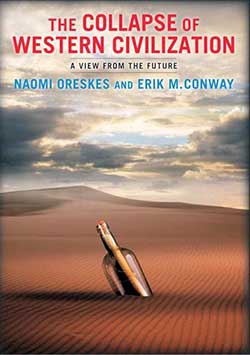The Collapse of Western Civilization - A View from the Future
By Naomi Oreskes and Erik M Conway | New York, Columbia University Press, 2014
 Reviewed by Alvin M. Saperstein
Reviewed by Alvin M. Saperstein
Historians usually write in the present about the past. In this somewhat unusual small (81 small pages) “science-fiction” book, supposed historians of the distant future are looking back on today’s world and its subsequent collapse due to global warming. The emphasis is on established science; the supposedly fictional decline in the Earth’s livable land area and population is a straightforward extrapolation from existing trends. Oreskes and Conway, authors of the superb and still valuable 2010 account of contemporary attacks on the application of science to society — “Merchants of Doubt”, focus on two basic concepts: “Baconianism” and “Market Fundamentalism”. Baconianism is the general scientific outlook that experience, observation, and experiment leads to reliable knowledge, upon which power over the natural world can be based. The authors emphasize both the reliability of the existing knowledge and the powerlessness of contemporary scientists to shape public policy based on that knowledge. “Market fundamentalism” is described as a quasi-religious dogma, “promoting unregulated markets over all other forms of human socioeconomic organizations”. This extreme “neo-liberalism” leads to the failure of a supportive terrestrial environment, the subsequent collapse of democratic civilization, and the triumph of the centralized despotic governmental power that was the locus of the neo-liberalists loathing. The thrust of the book can be summarized in two phrases: “The invisible hand” (of the market) “never picks up the check”, and “the neoliberal worship of deregulation leads directly to the poisoning of ourselves and the rest of the world”. The story, based on these thrusts, as told by a “future historian living in the Second People’s Republic of China”, about the “Great Collapse and Mass Migration (2073-2093)”, is a good one, and challenges all, scientist and non-scientist, to action based upon our abundant knowledge. It may take a short time to read but should result in much thinking and conversation.
The articles in this issue represent the views of their authors and are not necessarily those of the Forum or APS.
